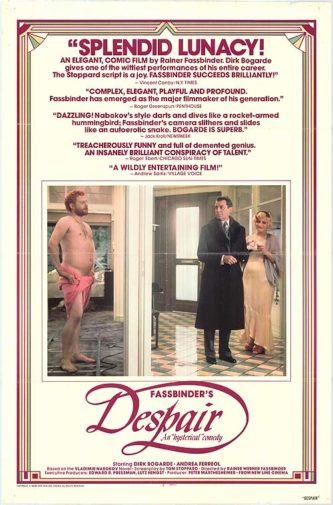 This 1978 film was apparently an attempt at “commercial filmmaking” by Germany’s late Rainer Werner Fassbinder (1945-1982). It was filmed in English (Fassbinder’s only film to be entirely shot and exhibited thus), had a bonafide movie star in the form of England’s Dirk Bogarde, was scripted by the eminent Tom Stoppard from a novel by Vladimir Nabokov, and reportedly cost more than all of its maker’s previous films combined. Yet the flamboyant atmosphere, marked by deliberately artificial scenery and an absurdly melodramatic score, marks out DESPAIR as a quintessential Fassbinder product.
This 1978 film was apparently an attempt at “commercial filmmaking” by Germany’s late Rainer Werner Fassbinder (1945-1982). It was filmed in English (Fassbinder’s only film to be entirely shot and exhibited thus), had a bonafide movie star in the form of England’s Dirk Bogarde, was scripted by the eminent Tom Stoppard from a novel by Vladimir Nabokov, and reportedly cost more than all of its maker’s previous films combined. Yet the flamboyant atmosphere, marked by deliberately artificial scenery and an absurdly melodramatic score, marks out DESPAIR as a quintessential Fassbinder product.
The setting is Berlin in the 1930s. There Hermann Hermann (Bogarde), the wealthy owner of a chocolate factory, finds himself dissatisfied with his existence. That’s despite the fact that he lives in an elaborately decorated mansion and has an attractive spouse (Andrea Ferreol). One day Hermann meets Felix (Klaus Lowitsch), a swarthy laborer, and is immediately convinced the guy is his “double,” even though in reality the two look nothing alike (in direct contrast to Nabokov novel, in which we’re initially informed that the two characters really are identical, only to be gradually disabused of that notion). This leads to a succession of nightmares involving Felix, and an elaborate plan whose particulars are foreshadowed by Hermann’s uncontrollable penchant for substituting the word “murder” for “merger.”
His plan, we learn, entails roping Felix into playing Hermann’s double in a nonexistent movie. When this ruse fails Hermann cooks up a much simpler gambit in which Felix is instructed to drive through the streets of Berlin wearing Hermann’s clothes. Felix is skeptical but eventually agrees, and meets Hermann in the midst of a forest, where Hermann shaves Felix and dresses him in one of his own suits—and then shoots him in the back.
From there Hermann, disguised (he thinks) as Felix, checks himself into a swanky hotel. Here he’s made privy to the newspaper accounts of the killing, which only prove that Hermann’s “perfect” killing wasn’t nearly as perfect as he believed.
This is certainly one of the best looking films ever made by Fassbinder and his longtime cinematographer Michel Ballhaus (1935-2017). From the fetishistic close-ups of glasses and eggshells of the opening scenes to the gaudily lit interiors that are perfectly matched with the naturally illuminated exterior shots, the film is a visual tour de force. Unfortunately, Fassbinder and Ballhaus are overly infatuated with Hermann’s art deco mansion, where a great deal of the film takes place; seemingly every shot therein is visualized through elaborately decorated windows and gaudily colored scenery, which grows wearying.
Dramatically DESPAIR isn’t as strong as it could have been. Lacking is the playfulness of the Nabokov novel (whose narrator at one point jokes about titling it “Crime and Pun”), although Fassbinder and Stoppard do try and impart it. One area in which the film dramatically departs from the novel is its political content: the historical period in which the film is set is telegraphed by the presence of uniformed Nazis who appear periodically, presumably to mirror the protagonist’s inner disintegration (and give the proceedings a very CABARET-like feel).
DESPAIR undoubtedly excels in the lead performance of Dirk Bogarde. In a marvel of skill and audacity, Bogarde is called upon to navigate a lot of schizophrenic mood changes. Faring considerably less well is Andrea Ferreol as his sexy wife, who was admittedly struggling with her English, and doesn’t ever seem to have gotten a handle on her character. So this film, in summation, gets a split vote: it has plenty of good things, but not quite enough.
Vital Statistics
DESPAIR (DESPIAR—EINE REISE INS LICHT)
Bavaria Film International
Director: Rainer Werner Fassbinder
Producer: Peter Marthesheimer
Screenplay: Tom Stoppard
(Based on a novel by Vladimir Nabokov)
Cinematography: Michael Ballhaus
Editing: “Franz Walsch” (Rainer Werner Fassbinder), Juliane Lorenz
Cast: Dirk Bogarde, Andrea Ferreol, Klaus Lowitsch, Volker Spengler, Armin Meier, Peter Kern, Adrian Hoven, Alexander Allerson, Hark Bohm, Roger Fritz, Gottfried John, Y Sa Lo, Lilo Pempeit, Ingrid Caven, Voli Geiler
